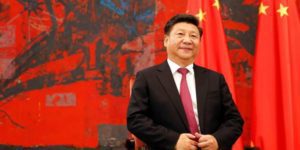December 2, 2021 by Tom Watkins / Opinion

Oh, how things have changed in China. The rise of the Chinese Communist Party (CCP) the past one hundred years has been brutal, offensive, uplifting, inspiring and as oppressive as it has been impressive at times. The CCP’s powerful Central Committee has passed a resolution that is expected to enhance President Xi Jinping’s grip on power as the 21st century unfolds. The resolution calls Xi’s ideology is “the epitome of the Chinese culture and soul.”
https://amp.dw.com/en/china-historic-resolution-seals-president-xis-grip-on-power/a-59792970
I have been an observer and at times a small participant in the changes in China having a lifelong interest in all things China and have traveled extensively across the country for the past 30 plus years.
Forty five years ago, Deng Xiaoping introduced major economic reforms–lifting hundreds of millions of people out of poverty and leading to it becoming the second-largest economy in the world, a superpower and has both economic and military muscle to flex on the global stage.
The China transformation we have witnessed from a poor backward society into one of the world’s most powerful economies and rising military might is nothing short of astounding. It is like watching a movie in black and white that gradually turns to Technicolor.
Pictures are worth a thousand words and the BBC News has captured the staggering changes in picture that allow the observer to see how ideological change has manifested itself for the average Chinese citizen.
https://www.bbc.com/news/world-asia-china-46602785
2019 marked the beginning of my fourth decade of travel to China – a land of joy, contradictions and convolutions. Today, I harken back to the time I became enthralled with all things China. I ponder the participant observations I have made over the past 30 years and can’t help but wonder what the future will bring. Given the tensions between our two nations the trajectory of change will clearly be different than the previous half century.
People Republic of China Turns 70
As the 21st century rolls on, one thing is certain: China will cast its giant shadow over the world. What happens in China will not stay in China. It will wash up on shores across the globe. Of this I am certain.
Mao Zedong’s–led party, the Chinese Communist Party (CCP) defeated their nationalist rivals and founded the People’s Republic in 1949 and have held a monopoly on power ever since. They continue to face a host of domestic and international challenges as they strive to achieve great-power status by no later than their centennial in 2049.
Idealism and Reality
I knew as a young boy that I would travel to China some day. This may seem a strange thought for a child of the 60’s – a time when China was as dark and mysterious to Americans then as North Korea is to us today. The U.S. had no formal diplomatic relationship with China since Mao Zedong’s Communist government came to power in 1949.
My childhood thoughts came a full decade before Nixon’s ping-pong diplomacy.
My passion about China, like many interests, was sparked by a great teacher. Her description to our 4th grade class of the unknown China made me want to know more. Why did she call the Chinese “Red” China with such disdain, when, if anything, they looked yellow to me? Why did she tell me communism was bad and then describe a communist country as a place where they “believe everyone is equal?” “What is wrong with that?” my young mind pondered.
Why did she tell us “in America everyone is equal,” when I only needed to swivel my head around my hometown, the nation’s capital of Washington, DC, to discern that this was simply not true. Even my young, myopic eyes could see that rich people were treated differently than poor people and black people were clearly not treated equal to whites.
As a child, I wanted to believe that China was a magical place, a place like the fictional Lake Wobegon, where everyone was truly equal. As I matured and learned, I knew this not to be true as I took my first of many trips to China in 1989. Yet, It was the first step on my journey of many miles that has taken me to every corner of China. Including the politically sensitive areas of Tibet, Xinjiang, Taiwan and Hong Kong. Not to mention my nights with the student protesters in Tiananmen Square in May, 1989.
I have alternately been astonished, bewildered, disappointed, saddened, angered and disillusioned through the years of this thin slice of my journey, considering it has been just a few decades of traveling here to learn about China’s rich 5,000-year history.
My eyes have always been wide open as I have tried to understand and explain what I have experienced. I have made it a quest to educate people on both sides of the ocean while striving to build cultural, educational, and economic bridges between our two nations. I have written extensively about this most important bilateral relationship; U.S. and China and have worked to build cultural, economic and educational ties between our two nations.
Humiliation No More!
August 11, 1842, marked the date that many Chinese note as the start of modern history when the Qing Dynasty signed the unequal treaty of Nanjing, which allowed for Great Britain to end the devastating First Opium War (1839-42).
Things have taken a miraculous turn for the better since that century of humiliation.
Imagine if Mao Tse-tung could come back for a day. He would see what the leaders and the people of China have accomplished since October 1, 1949 when he stood at the gates of Tiananmen Square, proclaiming the founding of The People’s Republic of China.
President Xi delivered a defiant and matter of fact speech marking the centenary of the ruling Chinese Communist Party (CCP) warning that foreign powers will “get their heads bashed” if they attempt to bully or interfere in the internal affairs of China. President Xi also made it crystal clear China would not be lectured to nor allow “sanctimonious preaching,” in remarks certainly as directed at the U.S.
The Pentagon is getting more and more vocal about the Chinese military muscle, saying China is expanding its nuclear force much faster than U.S. officials predicted just a year ago. They believe Beijing’s goal is to match or surpass U.S. global power by mid-century. I find the “alarm” that China is striving to outpace us, be it economically, technologically, militarily in space or any other sphere to be perplexing. Of course they do, what great power has ever set their goal to be number 2?
The fact that China wants to regain its place as Zhonggou or the “Middle Kingdom” should shock no one. Especially our intelligence and military community. The hysteria seems targeted to scare Americans more so than as a surprise to anyone paying attention. As I have argued for over a decade, the best offense to combat the inevitable rise of China is the investment in America and the American people.
https://usheartlandchina.org/opinion/to-compete-with-china-invest-in-america/
Some in the U.S. believe the Military Industrial Complex is pushing the fear China narrative as a way to justify their continual bloated military budgets.
The CCP are astute students of history, both their own and globally and have learned when any nation, including their own is unprepared and fails to respond adequately to internal and external threats, the very foundation of its power and legitimacy will be shattered with the resulting loss of prestige, power, territory and self-confidence. Clearly, President Xi Jinping has made it abundantly clear that China has stood up, reclaiming its wealth and power and will not be caught off guard being weak again and will not be humiliated.
Bend But Not Break
As Michael Beckly and Hal Brands articulate in their recent article in The Atlantic: What Will Drive China to War? China can and will turn to confrontation and even war when confronted with the prospect of permanently losing control of territory. The authors continue, get ready for the “terrible 2020s”: a period in which China has strong incentives to grab “lost” land and break up coalitions seeking to check its advance.
Newton’s third law is: For every action, there is an equal and opposite reaction. With the lack of trust and breakdown in following of the 6-C’s between the U.S. and China a confrontation between our nations is regrettably and frighteningly plausible today.
https://www.chinausfocus.com/peace-security/what-could-cause-a-us-china-war
It could be argued the CCP grip on China is always tenuous and perhaps more so today with the COVID-19 pandemic, slowing of the economy, an aging society, U.S. allies joining forces as a antidote to China’s rise and the tensions on multiple borders must keep the Chinese leadership from getting the best night’s sleep.
Yet today, it seems Xi Jinping has the divine source of authority or the Mandate from Heaven to weather the challenges that lie ahead. There is a nationalist fever that runs deep in China. I have witnessed the CCP’s ability to turn on and off the Chinese citizens’ nationalism like a light switch. The question going forward is will the Nationalistic fever be as easily manipulated?
They can amplify perceived threats to China by “hostile foreign forces” that are bent on holding China back. The hostile foreign forces are often a catch-all for anyone or anything that does not conform with Chinese Communist Party (CCP) interests.
China’s leaders can and do stoke nationalist pride to solidify their power, hammering home messages about their superiority and the necessity of party control for China’s continued rise. Perhaps one of their miraculous achievements lifting twice as many Chinese people from abject poverty than the USA has is a testimonial reminder to all of the power and focus of the CCP to improve the Chinese people’s condition. Ending abject poverty while the rest of the world is set to see an increase in it is a remarkable achievement worthy of the Nobel peace prize. An iron fist and a rising economic tide have been the formula that has thus far kept China from being added to the list of countries in revolt.
There has been an unwritten trade-off between the Communist Party (CCP) and the people. Simply put: “The people’s lives continue to prosper and the Communist Party continues its rule.” Has this formula run its course? Will President Xi’s pivots and corrections placate the masses?
Has President Xi reigned in the power of tech giants and the billionaire class showing his Mao like Socialist chops? He is certainly reclaiming Mao’s mantle, once again making a major China pivot, seeing capitalism as a transitory phase on the road to socialism.
President Xi seems to be reinstating a call for an iron rice bowl by promising “common prosperity” to lift farmers and working families into the middle class. In America we would call this buying votes or a chicken in every pot and in China I believe it is an attempt to solidify his Mandate from Heaven. As President Xi knows, and as Mao once proclaimed, “A single spark can start a raging forest fire.”
Chaos in China will not be good for the CCP, the Chinese people nor for people around the world. A continuous Mandate from Heaven may be in everyone’s best interest.

Tom Watkins is a U.S.-China business and educational consultant who has worked to build cultural, educational, and economic ties between our two countries for 4 decades. He served Michigan citizens as State Superintendent of Schools and State Mental Health Director; and in Palm Beach County, Florida, as that county’s President and CEO of the Economic Council.
Read his thoughts on U.S.-China relations at: https://www.chinausfocus.com/author/84/tom-watkins.html or contact him tdwatkins88@gmail.com.


A nuanced and sophisticated observation on China and CCP. Brilliant! Keep up the good work, Tom!
I pray for the end of “Mandates from Heaven” & other forms of Divinity for completely human & thereby flawed political leaders 🙏🏾